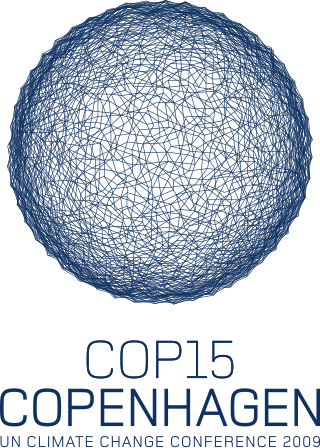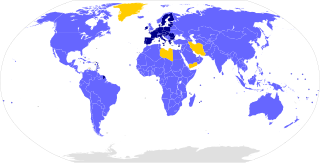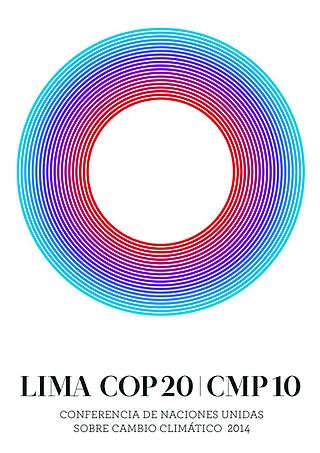
The United Nations Framework Convention on Climate Change (UNFCCC) is the UN process for negotiating an agreement to limit dangerous climate change. It is an international treaty among countries to combat "dangerous human interference with the climate system". The main way to do this is limiting the increase in greenhouse gases in the atmosphere. It was signed in 1992 by 154 states at the United Nations Conference on Environment and Development (UNCED), informally known as the Earth Summit, held in Rio de Janeiro. The treaty entered into force on 21 March 1994. "UNFCCC" is also the name of the Secretariat charged with supporting the operation of the convention, with offices on the UN Campus in Bonn, Germany.
Post-Kyoto negotiations refers to high level talks attempting to address global warming by limiting greenhouse gas emissions. Generally part of the United Nations Framework Convention on Climate Change (UNFCCC), these talks concern the period after the first "commitment period" of the Kyoto Protocol, which expired at the end of 2012. Negotiations have been mandated by the adoption of the Bali Road Map and Decision 1/CP.13.

The 2009 United Nations Climate Change Conference, commonly known as the Copenhagen Summit, was held at the Bella Center in Copenhagen, Denmark, between 7 and 18 December. The conference included the 15th session of the Conference of the Parties to the United Nations Framework Convention on Climate Change (UNFCCC) and the 5th session of the Conference of the Parties serving as the Meeting of the Parties to the Kyoto Protocol. According to the Bali Road Map, a framework for climate change mitigation beyond 2012 was to be agreed there.

The Climate Vulnerable Forum (CVF) is a global partnership of countries that are disproportionately affected by the consequences of climate change. The forum addresses the negative effects of climate change as a result of heightened socioeconomic and environmental vulnerabilities. These countries actively seek a firm and urgent resolution to the current intensification of climate change, domestically and internationally. The CVF was formed to increase the accountability of industrialized nations for the consequences of global climate change. It also aims to exert additional pressure for action to tackle the challenge, which includes the local action by countries considered susceptible. Political leaders involved in this partnership are "using their status as those most vulnerable to climate change to punch far above their weight at the negotiating table". The governments which founded the CVF agree to national commitments to pursue low-carbon development and carbon neutrality.

The 2010 United Nations Climate Change Conference was held in Cancún, Mexico, from 29 November to 10 December 2010. The conference is officially referred to as the 16th session of the Conference of the Parties (COP 16) to the United Nations Framework Convention on Climate Change (UNFCCC) and the 6th session of the Conference of the Parties serving as the meeting of the Parties (CMP 6) to the Kyoto Protocol. In addition, the two permanent subsidiary bodies of the UNFCCC — the Subsidiary Body for Scientific and Technological Advice (SBSTA) and the Subsidiary Body for Implementation (SBI) — held their 33rd sessions. The 2009 United Nations Climate Change Conference extended the mandates of the two temporary subsidiary bodies, the Ad Hoc Working Group on Further Commitments for Annex I Parties under the Kyoto Protocol (AWG-KP) and the Ad Hoc Working Group on Long-term Cooperative Action under the Convention (AWG-LCA), and they met as well.

Karen Christiana Figueres Olsen is a Costa Rican diplomat who has led national, international and multilateral policy negotiations. She was appointed Executive Secretary of the UN Framework Convention on Climate Change (UNFCCC) in July 2010, six months after the failed COP15 in Copenhagen. During the next six years she worked to rebuild the global climate change negotiating process, leading to the 2015 Paris Agreement, widely recognized as a historic achievement.

Avoided Deforestation Partners, or AD Partners, is a non-profit organization under the auspices of the Center for International Policy in Washington, D.C. AD Partners is involved in the global effort to solve climate change by working to end deforestation in tropical rainforest countries. By avoiding the practice of deforestation, i.e., clearing forests to provide inexpensive farmland, potential carbon emissions are prevented. In addition, avoiding deforestation also allows forests to sequester carbon and scrub the air of pollutants. Beyond protecting the Earth's air quality, tropical forests facilitate conditions for rain, replenish water sources, provide habitats for myriad plant and animal species, and sustain the livelihoods of 1.6 billion people globally. Leading scientists and economists say that ending deforestation is the most cost effective and scalable method of reducing greenhouse gases. In fact, they believe that ending deforestation will cut the timeframe for solving the climate crisis in half.

The Paris Agreement is an international treaty on climate change that was signed in 2016. The treaty covers climate change mitigation, adaptation, and finance. The Paris Agreement was negotiated by 196 parties at the 2015 United Nations Climate Change Conference near Paris, France. As of February 2023, 195 members of the United Nations Framework Convention on Climate Change (UNFCCC) are parties to the agreement. Of the three UNFCCC member states which have not ratified the agreement, the only major emitter is Iran. The United States, the second largest emitter, withdrew from the agreement in 2020, rejoined in 2021, and announced its withdrawal again in 2025.

The Green Climate Fund (GCF) is a fund for climate finance that was established within the framework of the United Nations Framework Convention on Climate Change (UNFCCC). Considered the world's largest fund of its kind, GCF's objective is to assist developing countries with climate change adaptation and mitigation activities. The GCF is an operating entity of the financial mechanism of the UNFCCC. It is based in Songdo, Incheon, South Korea. It is governed by a Board of 24 members and supported by a Secretariat.

The United Nations Climate Change Conferences are yearly conferences held in the framework of the United Nations Framework Convention on Climate Change (UNFCCC). They serve as the formal meeting of the UNFCCC parties – the Conference of the Parties (COP) – to assess progress in dealing with climate change, and beginning in the mid-1990s, to negotiate the Kyoto Protocol to establish legally binding obligations for developed countries to reduce their greenhouse gas emissions. Starting in 2005 the conferences have also served as the "Conference of the Parties Serving as the Meeting of Parties to the Kyoto Protocol" (CMP); also parties to the convention that are not parties to the protocol can participate in protocol-related meetings as observers. From 2011 to 2015, the meetings were used to negotiate the Paris Agreement as part of the Durban platform, which created a general path towards climate action. Any final text of a COP must be agreed by consensus.

Arctic Circle is an organization founded by former President of Iceland Ólafur Ragnar Grímsson, former Alaska Dispatch Publisher Alice Rogoff, former Premier of Greenland Kuupik Kleist and other partners. The organization's mission is to facilitate dialogue among political and business leaders, environmental experts, scientists, indigenous representatives, and other international stakeholders to address issues facing the Arctic as a result of climate change and melting sea ice. The Arctic Circle styles itself as an international organization with a Secretariat based in Reykjavík, Iceland.

The United Nations Climate Change Conference, COP20 or CMP10 was held in Lima, Peru, from December 1 to 12, 2014. This was the 20th yearly session of the Conference of the Parties to the 1992 United Nations Framework Convention on Climate Change (UNFCCC) and the 10th session of the Meeting of the Parties to the 1997 Kyoto Protocol. The conference delegates held negotiations towards a global climate agreement.

The 2015 United Nations Climate Change Conference, COP 21 or CMP 11 was held in Paris, France, from 30 November to 12 December 2015. It was the 21st yearly session of the Conference of the Parties (COP) to the 1992 United Nations Framework Convention on Climate Change (UNFCCC) and the 11th session of the Meeting of the Parties (CMP) to the 1997 Kyoto Protocol.

The nationally determined contributions (NDCs) are commitments that countries make to reduce their greenhouse gas emissions as part of climate change mitigation. These commitments include the necessary policies and measures for achieving the global targets set out in the Paris Agreement. The Paris Agreement has a long-term temperature goal which is to keep the rise in global surface temperature to well below 2 °C (3.6 °F) above pre-industrial levels. The treaty also states that preferably the limit of the increase should only be 1.5 °C (2.7 °F). To achieve this temperature goal, greenhouse gas emissions should be reduced as soon as, and by as much as, possible. To stay below 1.5 °C of global warming, emissions need to be cut by roughly 50% by 2030. This figure takes into account each country's documented pledges or NDCs.

The Global Covenant of Mayors for Climate & Energy (GCoM) was established in 2016 by bringing formally together the Compact of Mayors and the European Union's Covenant of Mayors. It is a global coalition of city leaders addressing climate change by pledging to cut greenhouse gas emissions and prepare for the future impacts of climate change. The Compact highlights cities' climate impact while measuring their relative risk levels and carbon pollution. The Compact of Mayors seeks to show the importance of city climate action, both at the local level and around the world. The Compact was launched in 2014 by UN Secretary General Ban Ki-moon and former New York City Mayor Michael Bloomberg, the UN Special Envoy for Cities and Climate Change. The Compact represents a common effort from global city networks C40 Cities Climate Leadership Group (C40), ICLEI, and United Cities and Local Governments (UCLG), as well as UN-Habitat, to unite against climate change. 12,500 cities and local governments have committed to the Compact of Mayors. These cities hail from 6 continents and 144 countries. In total, they represent more than 1 billion people.

The 2016 United Nations Climate Change Conference was an international meeting of political leaders and activists to discuss environmental issues. It was held in Marrakech, Morocco, on 7–18 November 2016. The conference incorporated the twenty-second Conference of the Parties (COP22), the twelfth meeting of the parties to the Kyoto Protocol (CMP12), and the first meeting of the parties to the Paris Agreement (CMA1). The purpose of the conference was to discuss and implement plans about combatting climate change and to "[demonstrate] to the world that the implementation of the Paris Agreement is underway". Participants work together to come up with global solutions to climate change.
The 2018 United Nations Climate Change Conference, more commonly referred to as the Katowice Climate Change Conference or COP24, was the 24th Conference of the Parties to the United Nations Framework Convention on Climate Change. It was held between 2 and 15 December 2018 at the International Congress Centre in Katowice, Poland.

The 2021 United Nations Climate Change Conference, more commonly referred to as COP26, was the 26th United Nations Climate Change conference, held at the SEC Centre in Glasgow, Scotland, United Kingdom, from 31 October to 13 November 2021. The president of the conference was UK cabinet minister Alok Sharma. Delayed for a year due to the COVID-19 pandemic, it was the 26th Conference of the Parties (COP) to the United Nations Framework Convention on Climate Change (UNFCCC), the third meeting of the parties to the 2015 Paris Agreement, and the 16th meeting of the parties to the Kyoto Protocol (CMP16).

Joshua Amponsem is a Ghanaian climate advocate and a co-founder of Green Africa Youth Organization (GAYO). He is the climate specialist at the Office of the UN Secretary General's Envoy on Youth. He is the Lead Author of Adapt for Our Future, the first-ever research paper on the role of youth in advancing climate adaptation. His career has been more focused on grassroots climate and waste management solutions while advancing youth engagement in resilience building, disaster risk reduction, and climate change adaptation at the international level.

















